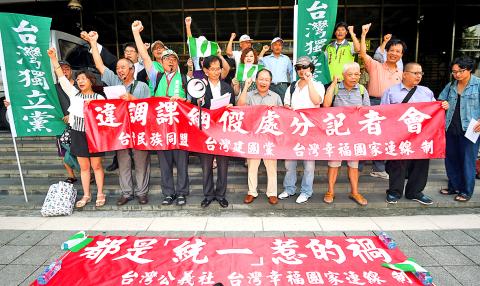Civic groups and pro-Taiwanese independence parties gathered at the Taipei District Court yesterday to lodge a provisional injunction aimed at halting the Ministry of Education’s proposed adjustments to high-school curriculum guidelines.
The group said the adjustments are an attempt by the Chinese Nationalist Party (KMT) to use the state education system to brainwash students with China-centric textbook material.
The legal move and rally activities were organized by the Taiwanese National Congress and the Taiwan Government Party.

Photo: Lo Pei-der, Taipei Times
The groups’ leaders said the move is to support protests by high-school students aimed at blocking the amendments, adding that going through a judicial process would be the most effective way of achieving their objectives.
Representatives from the Taiwanese National Party, Taiwan Independence Party (TIP), Happy National Connection in Taiwan and the Nation-Building Forum were among those who attended the court.
Attorney Tsai Shang-hua (蔡尚樺) said that the injunction application was made for two main reasons: First, the amendment process was not transparent and was based on the decisions of a few elitist educators and consultants; and second, the new content would not be suitable for use at school.
Tsai said that according to legal procedure, a judge would review the documents filed with the injunction and could order a hearing, before which the ministry would not be able implement the curriculum changes.
Taiwan Government Party Chairman Huang Kuo-hua (黃國華) said the curriculum changes are an attempt by the KMT government to marginalize Taiwanese culture and history, and to eradicate people’s Taiwanese identity.
“It is an act of resistance against the KMT for students and society to take up this protest, as the government is ramming its pro-China policy down people’s throats,” Huang said. “I am deeply moved by the actions of students to resist the government’s attempt at brainwashing. Our lodging of the injunction can provide a shield to buttress the students’ actions.”
Former Taipei City councilor Chen Shu-hua (陳淑華) said that the ministry appointed only pro-Chinese academics to make the changes, which brought about the input of Sino-centric viewpoints.
The changes are “historical revisionism” at its worst, Chan said.
TNP Chairman Tsua Gim-liong (蔡金龍) said the protests against the changes are to make it loud and clear to the world that Taiwanese do not want to be ruled by China.
The actions are an expression of self-determination by Taiwanese, which are to eventually bring about an independent and democratic nation, Tsua said.

The manufacture of the remaining 28 M1A2T Abrams tanks Taiwan purchased from the US has recently been completed, and they are expected to be delivered within the next one to two months, a source said yesterday. The Ministry of National Defense is arranging cargo ships to transport the tanks to Taiwan as soon as possible, said the source, who is familiar with the matter. The estimated arrival time ranges from late this month to early next month, the source said. The 28 Abrams tanks make up the third and final batch of a total of 108 tanks, valued at about NT$40.5 billion

Two Taiwanese prosecutors were questioned by Chinese security personnel at their hotel during a trip to China’s Henan Province this month, the Mainland Affairs Council (MAC) said yesterday. The officers had personal information on the prosecutors, including “when they were assigned to their posts, their work locations and job titles,” MAC Deputy Minister and spokesman Liang Wen-chieh (梁文傑) said. On top of asking about their agencies and positions, the officers also questioned the prosecutors about the Cross-Strait Joint Crime-Fighting and Judicial Mutual Assistance Agreement, a pact that serves as the framework for Taiwan-China cooperation on combating crime and providing judicial assistance, Liang

A group from the Taiwanese Designers in Australia association yesterday represented Taiwan at the Midsumma Pride March in Melbourne. The march, held in the St. Kilda suburb, is the city’s largest LGBTQIA+ parade and the flagship event of the annual Midsumma Festival. It attracted more than 45,000 spectators who supported the 400 groups and 10,000 marchers that participated this year, the association said. Taiwanese Designers said they organized a team to march for Taiwan this year, joining politicians, government agencies, professionals and community organizations in showing support for LGBTQIA+ people and diverse communities. As the first country in Asia to legalize same-sex

MOTIVES QUESTIONED The PLA considers Xi’s policies toward Taiwan to be driven by personal considerations rather than military assessment, the Epoch Times reports Chinese President Xi Jinping’s (習近平) latest purge of the Chinese People’s Liberation Army (PLA) leadership might have been prompted by the military’s opposition to plans of invading Taiwan, the Epoch Times said. The Chinese military opposes waging war against Taiwan by a large consensus, putting it at odds with Xi’s vision, the Falun Gong-affiliated daily said in a report on Thursday, citing anonymous sources with insight into the PLA’s inner workings. The opposition is not the opinion of a few generals, but a widely shared view among the PLA cadre, the Epoch Times cited them as saying. “Chinese forces know full well that